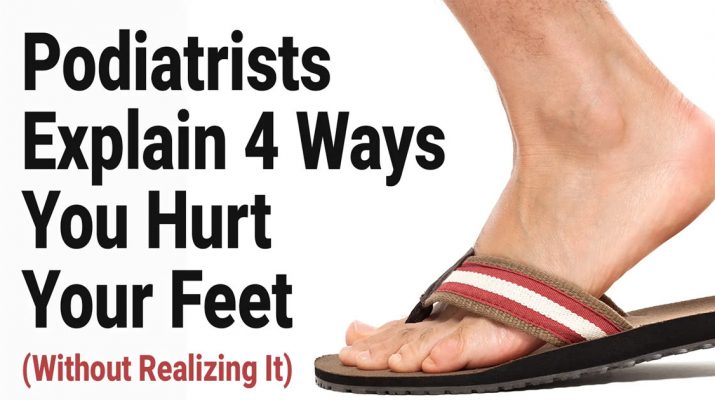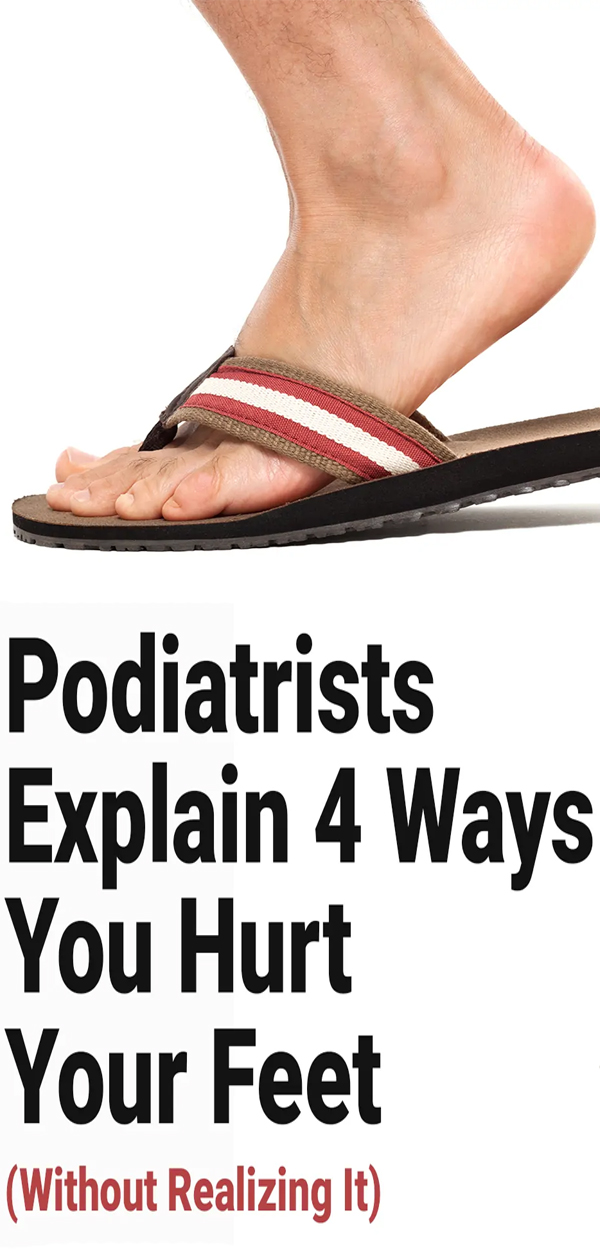You use your feet for a number of physical activities and movements. Walking may be the easiest exercise you can do, as long as you’re not dealing with some kind of a pain in your feet. On the other hand, every step may feel like torture when you have a foot problem.
Experts in a survey from the American Orthopedic Foot and Ankle Society (AOFAS) determined that at least 80 percent of the population experience pain in their feet, which often goes untreated or undiagnosed. This means that there are plenty of individuals living with foot issues, which may make a simple walk nothing but painful.
You may be part of the statistics for those suffering from foot pain. Podiatrists explain that some of the things you do might contribute to this health issue. So, let’s discuss some ways you’re hurting your feet without realizing it.
Here Are 4 Ways You Hurt Your Feet Without Realizing It
“People tell me their feet hurt because they’re getting older and it’s a natural part of aging. That’s not true. Pain is a sign of trouble.” – Martin Pressman, DPM
1. You Wear The Same Old Shoes Every Single Day
You have this favorite pair of shoes that you like wearing every day because it provides the best support for your feet. While this might seem like common sense, experts say that if you wear the same old shoes over and over, you might experience foot fatigue.
The support your favorite shoes provide won’t last forever. Over time, the soles will break down and affect the angle and pressure your feet make with each step. If your shoes are old but still feel comfortable it’s likely because they have reshaped to fit you, depending on how you walk and the weight of your body. However, if you notice the soles of your shoes thinning out or deforming, this means those comfortable shoes are no longer giving you the best support.
Eventually, you’ll start feeling foot fatigue and experience the following symptoms:
- Pain on your feet and even your knees, hips, and back
- Swelling of the feet and legs
- Cramping of the feet, toes, or calves
- Muscle soreness
If you still cannot part with your favorite shoes, you might want to consider having them re-soled (if they’re still presentable). In the long run, however, you will need to let go of them. No amount of re-soling will correct warping and unevenness. It will just continue to hurt your feet.
Wearing the same shoes every single day may also shorten the lifespan of your favorite pair. Your shoes absorb the sweat from your feet, which can impact the shoes’ material. So, you need let them dry out properly to maintain proper form and shape. For this reason, you should rotate your footwear and not use the same pair every day.
2. You Wear Ballet Flats, Sneakers, Or Flip-Flops To Make Commuting Comfortable
You might like wearing flat shoes, sneakers with no arch, and easy slip-on flip-flops whenever you’re commuting or traveling. However, experts say that flat footwear does not provide the right arch support and shock absorption. You will only end up hurting your feet and may even cause pain on your knees, hips, and back because the shoes don’t match the activity.
Poor arch support can lead to a condition called plantar fasciitis. It happens when the tissues on the soles of your feet, which can stretch from the heel to the toes, are inflamed.
- Are there instances when you feel a stabbing pain near the bottom of your heel?
- Does it worsen when you take a step, run, or exercise even while wearing flat shoes?
- These are clear indications that you’ve been wearing the wrong type of footwear when walking or commuting.
- If you ignore plantar fasciitis, it could develop into chronic pain that will further prevent you from regular activities.
If you still like to wear ballet flats or flat sneakers, perhaps try adding heel pads with some extra cushioning and arch to reduce the chances of hurting your feet. Insert these pads in the insoles so you can still get proper support.
As for flip-flops, most podiatrists advise against wearing this exposed footwear especially when you’re out for a walk. Aside from the lack of arch support, you’ll risk cutting, scraping and injuring your feet because the flip-flops are too open.
If you love the convenience and the unrestricted comfort of this shoe type, opt for the sporty fitted sandals that have thicker soles (at least two inches). Not only can you get good support from this design but the thickness may also raise your feet above the ground and away from harmful debris.
3. You Don’t Take Care Of Those Rough And Dry Patches Or Scales On Your Feet
What do you do when you spot rough and dry patches or scales on the soles of your feet? If you leave it alone, the condition may worsen and cause skin fissures (cracks). In worst cases, the cracks could grow into a full-blown infection that will prevent you from doing normal activities because you can’t walk or wear shoes for the time being.
There’s no pleasure in having dry patches on the feet because it could get uncomfortable and painful, as well as affect the way you walk and move. The scaling, cracking, and dry patches might be blamed on skin dryness because of the weather and too much sun exposure. However, this skin issue may also develop because of conditions. Allergies, athlete’s foot, actinic keratosis, contact dermatitis, eczema, psoriasis, ringworm, and other skin diseases all may cause these problems.
- Regularly applying lotion or moisturizer on the dry patches may help improve appearance.
- Once in a while, you might also want to indulge in a foot spa, a massage, or other salon procedures for your feet to make sure that the dryness does not worsen or make your feet hurt.
- If you’re already doing these treatments and indulges and you don’t see any positive changes on your feet, it might be time to visit a dermatologist or a podiatrist for a proper diagnosis and a treatment plan.
- In most cases, the skin disease may be easily cleared with a topical cream, such as an antifungal medication.
- The doctor might also prescribe oral medications if the problem is not, in fact, skin deep.
While dry patches aren’t considered a health emergency, you should still never ignore what’s happening to your feet.
Foot Self-Care Treatment
If you don’t like going to the spa for a treatment, you can do basic self-care at home as long as you have the right tools and materials.
- Always make it a point to wash and clean your feet, especially between the toes, using a soft washcloth and soap.
- Once a week, use a shower brush and take time to clean and smooth your soles to benefit from its exfoliating action.
- A couple of times a month, soak your feet in warm water and your preferred liquid dishwashing soap for at least 20 minutes.
- Some people use Epsom salts for soaking but this may lead to dryness, depending on your skin type.
- Don’t over-soak your feet because it will accelerate skin dryness.
- Always apply moisturizer every time you bathe or wash, especially during the colder months. You can use whatever moisturizing products you prefer.
- Switch shoes often and change your socks every day.
4. You Keep Covering Your Feet With Socks And Shoes Or Do The Opposite And Go Barefoot When You’Re Actively Doing Something
If you’re fond of wearing socks all day long and you barely go barefoot even when you’re just at home, you risk hurting your feet.
Covered Feet
Experts say that you need to air out your feet at night after they’ve been covered and protected inside your shoes all day.
- Just like the hands, the feet have sweat glands that cannot properly evaporate if they’re covered in socks and shoes.
- Microorganisms and skin fungus can easily reproduce in this moist and humid environment, which will then cause odor, itchiness, and infection.
- If you’re always wearing shoes, it might help to apply antiperspirant on your feet, especially in the warmer months. This will help lessen the chances of fungus from developing and hurting your feet.
- However, don’t use the same antiperspirant for your underarms for hygienic reasons, as these must be separate products.
Bare Feet
Now, if you’re the opposite and like to go barefoot a lot, you may also be bringing harm to your feet. Some activities might be done better when you are not wearing shoes, such as yoga or Pilates, but when you’re actively doing other stuff that brings low-impact pressure on your feet, then it makes more sense to wear good shoes to support and protect yourself.
- You’ll risk injuring your feet and stubbing your toes if you have no shoes on while running, jumping or walking quickly.
- You may experience pain in the heels, joint, and tendons, as well as contract an infection from going barefoot all the time.
It may feel great and energizing to walk on the grass, the sand, and the ground. When you’re going barefoot, your body is connecting to the surface electrons of the Earth, according to the Journal of Environmental Public Health. However, you shouldn’t make this a habit and allow your health to be vulnerable to harm and hurt.
If you know you’re going to be active on any given day, then wear the right footwear.
Final Thoughts On Ways You Hurt Your Feet Without Realizing It
As with the rest of your clothes, your choice of footwear is a matter of personal taste and style. However, you cannot just wear shoes based on their appearance or how you’ll look sporting them. You also need to pick the right type of footwear for your height, weight, gait, and activity.
Also, never ignore any pain and discomfort you experience, especially if it persists. Pay attention to these things by giving your feet some tender loving care and, if necessary, medical attention.
Your feet are your body’s workhorses so they should always be in the best shape. Set aside at least 20 minutes of your day to care for your feet and make the right choices on what shoes to wear.


